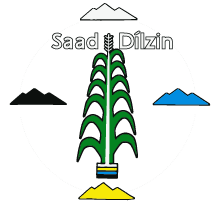Introduction to Navajo Questions
Any competent speaker of any language will be able to form questions. This resource is a combined grammar and lexicon of Navajo questions. We provide a description of three kinds of questions along with glossed examples and audio recordings of them. We think this resource will be useful to students and teachers of this language, and to professional linguists within and outside Navajo communities.
We distinguish three distinct kinds of questions: Yes/no questions, Content Questions, and Alternative Questions. We treat Tag Questions as a subtype of Yes/no questions. For this project we draw on previous work by Fernald & Perkins (manuscript), Young & Morgan (1987), Young, Morgan & Midgette (1992), and others cited in References [link].
| Da’ | Na’nízhoozhígóó | díníyá? |
| Q | Gallup-to | 2-go.F |
| Are you going to Gallup? | ||
| Mary | ha’át’íí | nayiisnii’? |
| Mary | what | 3-3-buy.P |
| What did Mary buy? | ||
| ’Atsį́’ísh | ’éí | doodaii’ | łóó’ísh | nínízin? |
| meat-Q | TOP | or | fish-Q | 3-2-want.NI |
| Do you want meat or fish? | ||||
Example (1) is a yes/no question, which has ‛yes’ or ‛no’ as an answer. Questions like this are used to ask whether a particular statement is true or not. In this example, the statement being asked about is Na’nízhoozhígóó díníyá, which means ‛You are going to Gallup’.
Content questions, like example (2), do not have simply ‛yes’ or ‛no’ as an answer. Rather than supplying a statement and asking whether it is true or not, they have the effect of providing a statement with some missing information, and they ask what that information is. In (2), the idea is that Mary bought something, and the question asks what that something is.
Alternative questions present the addressee with a choice between two or more options. Note that the English gloss in example (3) can be understood as either a yes/no question (if the intonation is rising on fish) or an alternative question (if the intonation is falling on fish). In Navajo, the sentence is an alternative question for which the appropriate answer will indicate which one of the choices is desired.
Glossing conventions and a note on morphology are here [link].
An example search has returned 50 entries
-t’ááh
Bich'ah haini'ą́, "díí bee yisdádíínááł," hałní jiní.
hat 3-2-give.P with.this.PP pl-2-survive.F 3-to.say.I they.sayBilagáana ła’ níhit’ááh dookah jiní.
Anglo some 1Pl-close.to 3-go.Pl.F 4-say.NICh’ééh jiyáán hooghangóó dah dii’ągo shee nikihoníłt.
watermelon home-toward up 3-1-move.SRO.P 1-with area-start-rain.PCh’óóshdą́ą́dą́ą́’ Bilagáanaa Bizaad doo diists’a’ da. K’ad ’éí t’áá shxǫǫ t’áá bee yáshti’.
formerly English neg 1-understand.I neg. Now TOP good.thing barely 3.with 1.speak-IBefore, I didn’t understand English. Now, thankfully, I can speak some.
bookmark- Imperfective (I) (∅, ni, si, yi-∅)find in Navajo Verb Modes
- diists’a hear, understandfind in Navajo Verb Modes
- Imperfective (I) (∅, ni, si, yi-∅)find in Navajo Verb Modes
- yáshti’ speakfind in Navajo Verb Modes
- ch’óóshdą́ą́dą́ą́’ formerly, originallyfind in Navajo Adverb Lexicon
- -ee by means offind in Navajo Postposition Lexicon
- instrumental
Chidí bitooʼ ʼásdįįdgo doo diitsʼį́į da dooleeł.
truck 3-gas 3-exhaust.NP-GO NEG 3-start.I NEG 3-become.Fdadiidį́į́ł
pl-3DO-1dpl-eat.it.Fdajíí’aal
pl-3DO-4dpl-chew.it.PDamóo yę́ędą́ą́’ Yootóógóó niséyá.
Sunday past Santa.Fe-to 1-go.Pdeiilyį́į́h
pl-3DO-1dpl-melt.it.(snow).IDibé yázhi bimá doo boosáni da, biʼnootsaał.
sheep little 3-mother NEG 3-love.I NEG 3-starve.ODichin nínízin ya’?
hungry 2-want.NI Qdidazhdiłjeeh
pl-3DO-4dpl-start.fire.Idiilyį́į́’
3DO-1dpl-melt.it.PDíidí háísh bichidí?
this who-Q 3-carDíí mósí yázhí hooghangóó nááshtééł.
this cat little home-towards 3-1-carry.ProgDoo deighánígóó łeeyi’ ’azhnígeed.
NEG far ground-inside 3-4-dig.PGohwééh t’áá bizhání ’éí doodaii’ ’abe’ biłgo daats’í nínízin?
coffee only TOP or milk 3-with-GO perhaps 3-2-want.NIha’át’éégóó
Hahgo Jáan hooghan ’íílééh?
When John hogan 3-3-make.FHazhóʼí sínídá. Tʼáadoo naaní’dííldisí.
careful 2-sit.I NEG again-2-wander.Prog-íSit still. Donʼt just run around.
bookmark- Progressivefind in Navajo Imperatives
- hazhóʼí carefullyfind in Navajo Adverb Lexicon
- Command, negativefind in Navajo Imperatives
- Command, affirmativefind in Navajo Imperatives
- t’áadoo notfind in Navajo Adverb Lexicon
- Progressivefind in Navajo Imperatives
- Imperfective (I) (∅, ni, si, yi-∅)find in Navajo Verb Modes
- sédá sitfind in Navajo Verb Modes
- Progressive (Prog)find in Navajo Verb Modes
jiyą́
3DO-4-eat.it.Ijoodlą́ą́’
3DO-4-drink.it.PMósí ch’óółt’e’ lágo.
cat out-3-2-carry.O LÁGONaakidi ’oolkiłgo ’áko ’índa ’áajigo dah diiyá.
two.at time-GO after.that. towards.GO start 1.go.INáás heesháałgo chidí bine’ ’ííyá.
forward 1-step.Prog-GO car 3-behind 1-go.Pniyą́
3DO-2-eat.it.ISha’áłchíní béeso ’ashladiin baa nínil ńt’éé’ t’ááła’ajį́ ’ałtso yibadooskai.
1-children money 50 3-for 2-put.PlO.P past at-once all 3-3-exhaust.PShimá sitsilí bibéésh bee hane’í bits’ą́ą́’ náádii’ą́.
1-mother 1-little.brother 3-cellphone 3-away.from 3-3-return.PT’áá ’ałkéé’ ’azee’ííł’íní bił yah ’adahaadzá.
just one-behind-another doctor 3-with 3-in 1Dist-4-go.IT’áá ká ’ooshháásh lágo.
neg 1-go.to.sleep.O LÁGOT'áá kwe’é shiba’ sínídáa doleeł.
just right.here 1-waiting.for 2-sit.SPN FUTTó lą’ígo nidlą́ ’áko bee nitah yá’áh’hoot’ééh dooleeł.
water many 3-2-drink.DI so 3-with 2-among pl-3-good.NI futureDrink lots of water so that you can be healthy.
bookmark- Imperfective (I) (∅, ni, si, yi-∅)find in Navajo Verb Modes
- ’áko so, so that, so thenfind in Navajo Conjunction Lexicon
- -ee by means offind in Navajo Postposition Lexicon
- -tah, -taa-, -ta- among, mixingfind in Navajo Postposition Lexicon
- Neuter Imperfective (NI)find in Navajo Verb Modes
- dooleeł futurefind in Navajo Adverb Lexicon
- dooleeł futurefind in Navajo Adverb Lexicon
Tsinaabąąs bee nida’abąąs yę́ędą́ą́’ shi’dizhchį́.
wagon 3-with pl-3-drive.I past 1-pass-born.PI was born during the time when wagons were used
bookmark- -ee by means offind in Navajo Postposition Lexicon
- Imperfective (I) (∅, ni, si, yi-∅)find in Navajo Verb Modes
- na’abąąs drivefind in Navajo Verb Modes
- yę́ędą́ą́’ pastfind in Navajo Conjunction Lexicon
- Perfective (P) (yi, ni, si, yi-∅)find in Navajo Verb Modes
- bi’dizhchį́ be bornfind in Navajo Verb Modes




